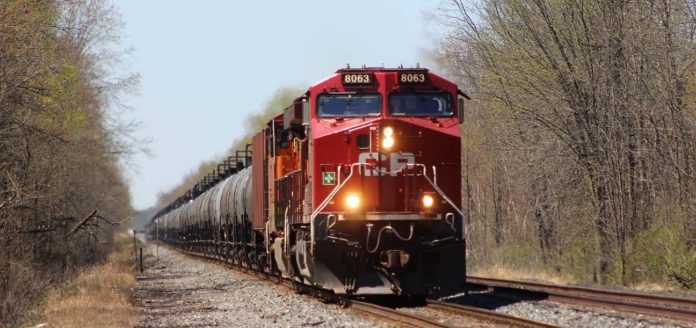A simple question asked in a local online Facebook group quickly turned into a fierce – and somewhat ugly – debate about whether train whistles are a life saver, or a nuisance. A local resident interested in moving to a local neighborhood created the online post to ask those who already live there whether they could hear the sound of the train horns from the nearby Canadian Pacific Railway tracks. That post quickly inspired another which proposed that “quiet communities” could be a goal in the future, achieved by means of eliminating train whistles at some local crossings.
Train “whistles” are still so-named on signage and in legislation despite the fact that they are now actually “horns”. They are a last line of defense at most crossings, used to warn pedestrians, cyclists, and motorists of an approaching train. The first line of defense at protected crossings is the warning system which usually consists of flashing lights and gates. A few local crossings do not have warning systems, instead requiring drivers to stop and look for trains (and listen for a horn) before crossing. Whether a crossing is protected or not, a sign (called a “whistlepost”) positioned a set distance from the crossing alerts train engineers to begin blowing their horn as they approach, with the horn being blown four times in a specific configuration.
The elimination of train whistles at protected crossings is possible, but not very common. It is more typical in cities, with one example being nearby, in Brockville. Eliminating train whistles at specific crossings is a process that must be initiated by local governments, usually at the request of residents who are fed up with the noise, particularly at night. Crossings must be fully protected and meet certain visibility and safety requirements for approval to be considered. It is worth noting that at crossings designated as “no whistle” crossings, train engineers always have overriding authority to blow the horn in cases such as a pedestrian or motorist on the tracks.
The debate online turned fierce, even leading to disagreement amongst some of the candidates running for local Council. A majority of locals appeared to strongly support train whistles as a safety imperative. Some pointed out that hearing train whistles is better than hearing emergency sirens rushing to the scene of a tragedy at the crossing. Many others who live near the tracks pointed out that they don’t even notice the train horns anymore, and some even said that they would miss hearing the horns. A few people spoke in support of eliminating train whistles at local crossings, but these minority comments were met with much criticism, often focusing on the differences between those accustomed to small town living, and those hailing from cities.
Complaints about train whistles are often challenged by the argument that one should adapt to the area to which they choose to move, rather than moving somewhere and then trying to institute changes. Another example is moving close to a factory which is known to produce odours, and then fighting for odour controls to be put in place.
Unfortunately for locals who hate noise, some crossings such as the Bedell Road crossing would simply never meet the safety requirements necessary for the elimination of train whistles. For the overwhelming number of local residents who appear to be in favour of safety over comfort, it appears that train whistles will continue to be music to their ears.







I have lived next to the CPR track in Merrickville for 40 years and do not even notice the train horns. As far as the safety aspect goes a young lady was killed by a train in Brockville (about 15 years ago). If I remember correctly there was no horn sounded.
If you move to live by the train tracks you will hear the whistles. Get used to it or go live somewhere else.